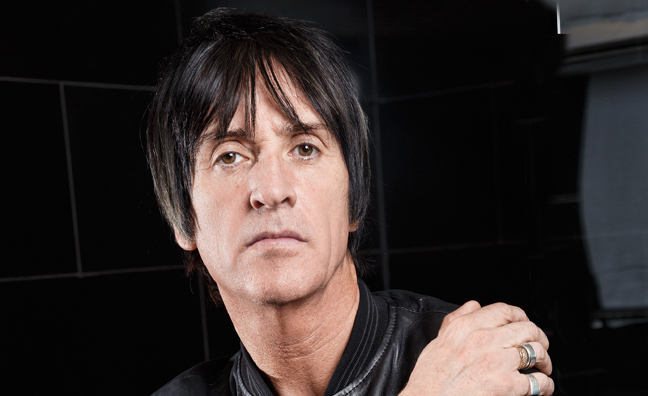Johnny Marr did not even have time to pop home when he kicked off a summer of festivals at London’s All Points East last Saturday (May 25). Arriving back in the UK the night before after completing his US tour in Los Angeles just days beforehand, the former Smith hit the festival circuit running. Having released brand, new standalone single Armatopia February following last year’s Call The Comet album – and with plans for more new releases this year – it is not just on the road where Marr is now wanting to move quickly. He shared his immediate plans with Music Week before taking to the stage at Victoria Park.
You wrapped your US tour up a few days ago but here you are at All Points East, you don’t seem to be hanging around.
Yep we’ve just got back from an American tour, and we’ve got a festival in Newcastle tomorrow, which is the start of our Europe tour of summer festivals, which is nice, you get to see other bands. I’ve been doing that since I’ve put my own band together really, since 2011. I often run a mental check ist on how things are going, and I caught myself thinking the other day ‘The band are tight, I think I’m playing and singing well, I like it!’ It made me think all our rehearsals are paying off and I really like this sparkly new guitar, it’s got something about its sound – and then I took a step back and thought: ‘It’s the songs you dick!’ The newer songs have really broadened the scope of the shows, they give them a dramatic aspect that I wasn’t really planning on.
Why have these songs given you an extra reach?
When I started writing the first solo record, it was my absolute intention to not sing about myself, but because I went into the third album without a gameplan, just following my emotions, I nervously ended-up writing more emotional music. Now, I’m seeing the result of it. The sets are quite beautiful and more dramatic. I want to do more of it. The second record was about being a modern rock band, and this third one is about me as a human. First one was, I was intentionally banging on and up-tempo and tightly edited. I tried to bring the energy with the second, I tried to make a classic second album. I always happened to like band’s second album; I don’t buy into the idea that second albums are treading water. The Talking Heads second album was my favourite, The Smiths second album was pretty good. I wanted to capture the energy of us touring, Then the third one really helped me out as I went in there following my emotions. I wasn’t sure what I was going to end-up with but it’s become the most popular.
Did writing your memoir, Set The Boy Free, have an influence on you writing about yourself?
I think the fact that I wrote the book had a lot to do with it, but not in the way you'd imagine. I wasn’t reflecting on any insights I got from the book, I was trying to get away from them, from the past. By the end of promoting the book, I really had to do something creative and something that made me feel… not a product. If you’re promoting songs or a record, you can talk about music conceptually, but when you promote your autobiography, it’s all about you and what happened when you went to school. I went straight from writing the book into mainstream media, and I found it very intrusive. So I just needed to get back into writing music just to satisfy my inner need. I wrote that record in the same way, emotionally, as when I used to sack of school and make tapes in my bedroom. I needed to re-connect with being a creative person. It was quite a pure impulse.
Your last single Armatopia was not on your last album, is this dipping your toe into the streaming world?
It was deliberately a standalone single. We actually did it plenty of those in The Smiths days, but I guess this was almost an experiment and low and behold, it was a success. I had no idea how it was going to go. I was surprised that it got loads of daytime airplay. I set myself the task of writing an eco-song without it being cheesy. It was a challenge. I’ve written another song that I’ll probably put out as a standalone single this year too.
Does it feel like you’re embracing something new, or just going back to the way you did things in The Smiths?
The debate about how we receive music and how we relate to music can often make us forget how we relate to a song. People have been relating to songs since secular music started. Look at this, we’re here at a festival [All Points East] in a park, all gathering together now as a bunch of strangers to listen to music, so it’s not a new thing. Regardless of digital device or vinyl, I think how people relate to music will never change. Pop music will not stop the Vietnam War anymore, musicians aren’t going to be able to release people from prisons, but how an individual relates to a song is never going to change. It’s always been there.
Read Rhino, East West and ADA at Warner Music president Dan Chalmers speaking to Music Week about his work with Johnny Marr, plus our subscribers can enjoy Seymour Stein's appreciation of The Smiths guitarist and our Aftershow Q&A with Marr.
The second weekend (May 31- June 2) of All Points East 2019 kicks of this evening, read Music Week's interview with promoter Oscar Thornton about this year's line-up.









